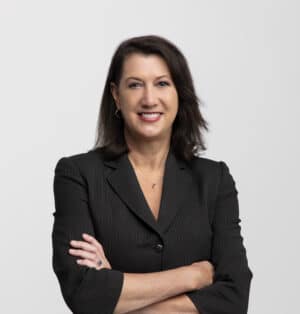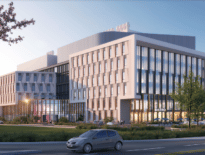Lisa Murray
Massachusetts Market President, Citizens
Age: 52
Industry experience: 29 years
Lisa Murray got her start in banking answering calls in Shawmut Bank’s customer service center, a role that she said gave her a broad understanding of retail banking, problem resolution and the importance of customer service. Nearly three decades later, Citizens Bank in September named Murray its Massachusetts market president. Murray replaced Jerry Sargent, who continues to oversee the New England and upstate New York markets as Citizens’ Northeast region executive.
Murray spent time at Fleet Bank after it acquired Shawmut. She then moved on to State Street Bank’s commercial bank, which merged into Citizens in 1999. At Citizens, Murray has worked with middle-market companies, as Sargent’s chief of staff and in her current role leading the region’s nonprofit and professional services banking, a role she will continue in addition to her duties as market president.
Q: What does your role as market president involve?
A: I’m officially the voice for the bank here in Massachusetts. So, whenever there’s any issues or questions, or we want to put something out in the public, it comes through me. But more so, it’s just meeting our clients. In my role as head of not-for-profit, it’s really a nice alignment with our community partners, because I interact with them with both hats on. I’m the face of the bank here in Massachusetts. If there’s an issue particular to Massachusetts that I think that the bank should be aware of, I communicate that up, so that they have a connection to each of our local communities.
Q: What does your role as head of not-for-profit involve?
A: I have a bunch of bankers that report to me, and we work with not-for-profits so that they can complete their mission. If they need financing, if they need cash management – any of the bank products – we’re their partner. So, we work on strategy; we work on different ideas that we can bring to not-for-profits to help them be more efficient.
Q: How does working with the not-for-profit sector give you insight into the Massachusetts market?
A: Not-for-profit is something that’s near and dear to my heart. I’ve been on the Pine Street Inn board for 20 years. I’ve done a lot in the community – just something that I personally feel very strongly about. Work with not-for-profits, and you get a real sense of what’s going on in the state in terms of where are the areas of vulnerability, where are we doing good work, are their pockets where we need to improve.
I haven’t been doing this long, but what I enjoy is bringing different not-for-profits together so that they can work together for a common good. We did a workforce development panel, and it was absolutely fascinating, because it was with Bunker Hill Community College, Year Up and the bank. There was a panel discussion about how we all have to work together – whether it’s the public sector, the private sector, government, not-for-profits – to solve issues. Each organization has their own particular strength, but we can accomplish so much more if we work together.
In follow up, I had two separate webinars with some of our community partners just to talk about the discussion, to just brainstorm ideas of how we can work together. People know each other, but everyone has their head down working tirelessly on their own missions. This was an opportunity to lift their head up, hear about what some other organizations are doing and think about ways to work together. I think that just was very powerful. And I know that our not-for-profits really enjoyed that because it gave them a chance to talk to their peers, work on a common goal.
Q: What are some other goals that you have in your role as market president?
A: I think I’ve been at Citizens for so long because what I’m passionate about is what the bank is passionate about as well. If you think about the things that Citizens tends to focus – it’s food insecurity, financial literacy and community empowerment. Those are the things that I really feel strongly about. So, it’s a nice mix for me. But really, just going out there and telling our story.
The DEI initiatives that we’re taking on at the bank are near and dear to my heart, so just continuing to think creatively about how we can help our customers, our community and our colleagues. We’re suffering, as everyone is, with a need to bring people into the bank. We can invest in training people of a diverse background, and Citizens does that very well. We absolutely are committed to DEI. We have a commercial development program for bankers that we have every year. About 20 people come in to be trained over the course of the year to be a commercial banker, and we are committed to that being a very diverse group. I think 50 percent of it is women, 30 percent of diverse background. And we are consistently filling our pipeline so that our bank looks like the community.
Q: What are your thoughts on being a woman in the role of market president at a bank as large as Citizens?
A: Obviously, I think it’s great. I look forward to the day where it’s not newsworthy that a woman is leading a major bank in Massachusetts, or anywhere else for that matter. I think we’re getting there. The more women we see in leadership positions the better, and it becomes sort of not noteworthy. We bring different perspectives to the table, and I think the best outcome comes from having many different perspectives and voices at the table. I’ve been thrilled with the outreach and the support that I’ve gotten. It’s just been fantastic, and I’m looking forward to helping those behind me.
Five Unexpected Positives Murray Found in the Pandemic
- Heightened creativity and innovation.
- Increased charitable giving.
- Discussions about mental health, childcare and elder care.
- A break for the environment.
- Perspective that empathy and kindness solve many problems.




 |
| 

